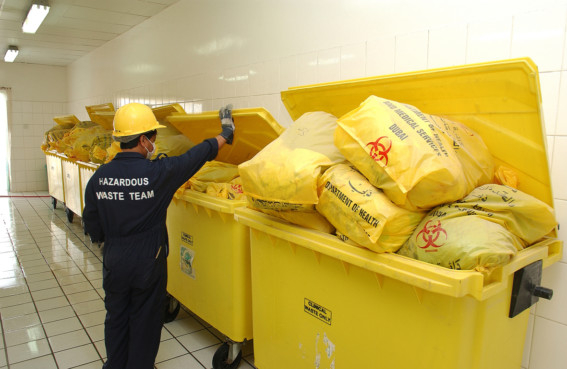
Dubai: You may have not noticed the yellow, air-conditioned vans driving at slow speed on Shaikh Zayed Road, but if you look carefully you will see that the vans have a special logo, a circle with three incomplete circles incorporated into it.
The way the logo is designed, it has a threatening look to it, and resembles the deadly Ninja metallic throwing star. It is just as well that this sense of danger emanates from it because these vans are carrying highly toxic material - medical waste.
Medical waste is one of the important wastes generated every day in all countries and unlike the every day household waste that we are all familiar with, medical waste is often unknown to or unnoticed by most of us.
It is primarily the output of hospitals, clinics and testing laboratories and pharmacies and it assumes a heightened importance because it calls for extreme care and caution not only in its handling but also in its specialised disposal.
Both aspects are critical to ensure there is no risk of contamination at any stage given that almost all of medical waste is teeming with bacteria and viruses.
Strict laws
In the UAE, strict laws govern the collection and disposal of medical waste. Medical waste treatment is a daunting task as it contains very highly infectious microbes that require special handling.
Hospitals, clinics and pharmacies in Dubai produce about 120 tonnes of hazardous trash per month that is burnt according to specifications in its incinerator. As the population of the emirate grows, Dubai Municipality plans to increase its capacity.
The facility has the capacity to treat 20 tonnes of waste per day and is said to be the second of its kind in the world as far as safety is concerned.
A senior municipal official earlier told Gulf News that medical institutions in Dubai produce about six tonnes of medical waste every day.
With more medical facilities and hospitals being built in new Dubai and expansion plans for the existing facilities in Dubai Health Care City and other areas, medical waste will easily double in daily output.
Dr Rashid Ahmad Bin Fahd, Minister of Environment and Water, earlier said that the UAE has taken the neccesary steps to safeguard the environment. The incinerator built by the Japanese company, Mitsubishi, at a cost of Dh24 million, has zero emissions, he said.
Getting rid of medical waste such as syringes, bloodstained bandages and adult nappies for paraplegics contain infectious microbes and these microbes emit various calories or thermal units when incinerated.
Stiff fines
Disposal of such waste is strictly controlled and hospitals are fined up to Dh200,000 if they are found to be bypassing the regulations in the way they handle it and segregate it.
A couple of years ago, Sharjah residents complained that clinics were blatantly disposing of this hazardous waste incorrectly and used syringes and bandages were being found in general trash bins in the emirate. That has since been rectified and stringent rules have been put into place and a new facility for biohazardous waste has been set up.
Collections
When it comes to the first stage of the waste disposal - collection of medical waste - the role of the companies who collect the waste plays a big role in the safety aspect.
“There are strict regulations regarding the transport of medical waste,” says Fadi Ganem, commercial manager of Sita Trashco Environmental Solutions, medical waste management company based in Al Quoz.
The collection vans, says Ganem, are temperature-controlled to between 18 and 20 degrees Celsius.
Bacteria and viruses thrive in the heat and the medical or biohazardous waste can become highly infectious and contaminate the vans if the temperature is not controlled to a cooler level.
“Infections could easily be transferred to the operators from the active bacteria and viruses, so they have to wear special safety equipment such as masks and gloves,”
Hospitals and clinics are advised to segregate their medical waste and place it in special yellow bins and these bins are kept in the basement at a cool temperature.
There are strict rules about the disposal of this waste and even the plastic bags are closed with steel ties, he informs.
There are a handful of other companies such as Trashco in Dubai that handle, transport and deliver the waste to the Dubai Municipal incinerator at Jebel Ali Free Zone.
The employees are trained in health and safety, according to French standards, says Ganem. “They are trained to also handle emergencies.”
Staff have to undergo various vaccinations such as hepatitis B. These companies also train hospital staff on the safe disposal methods of medical waste.












